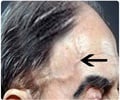The US FDA has approved the use of tocilizumab for the treatment of giant cell arteritis.
- Giant cell arteritis is an inflammatory disease that has limited treatment options mainly in the form of corticosteroids
- The recent FDA approval for tocilizumab will provide an alternative treatment to several patients
- The potential side effects of tocilizumab should be considered before prescribing
Corticosteroids, which quell inflammation in several inflammatory disorders, are used to treat giant cell arteritis. They are associated with a lot of adverse effects, especially during long-term treatment, but have to be used in the absence of better alternatives.
The injectable drug tocilizumab, which was earlier approved for the treatment of severe rheumatoid arthritis, has now been approved for the treatment of giant cell arteritis in adults. It causes remission in several patients with giant cell arteritis, during which it relieves symptoms, normalizes the abnormal blood tests that indicate inflammation, and reduces the need for corticosteroids.
It must however be noted that tocilizumab is not without side effects. It can predispose the development of serious bacterial, viral or fungal infections, as well as cause allergic reactions and reduced blood counts. It should be used with caution in patients with prior perforation of the digestive tract, since it can cause a repeat perforation. Patients should not receive treatment with live vaccines while taking tocilizumab.
Tolicizumab is administered via a subcutaneous injection for giant cell arteritis, wherein the drug is injected just below the skin. This could be a disadvantage, especially for people who do not prefer to take injections. Also, one must note that the intravenous administration has not yet been approved for giant cell arteritis.
Reference:
- FDA approves first drug to specifically treat giant cell arteritis - (https://www.fda.gov/NewsEvents/Newsroom/PressAnnouncements/ucm559791.htm)












